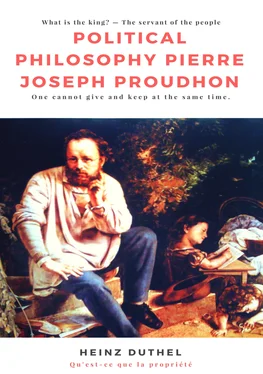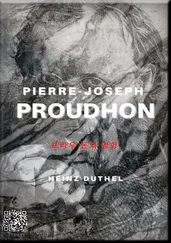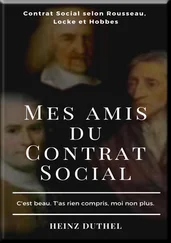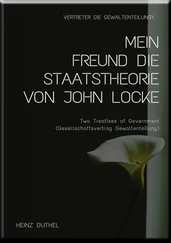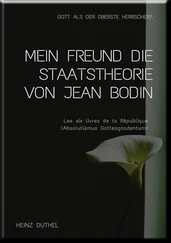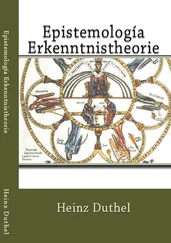His third memoir on property was a letter to the Fourierist, M. Considérant; he was tried for it at Besançon but was acquitted. In 1846, he published the Système des contradictions économiques ou Philosophie de la misère (or "The System of Economic Contradictions, or The Philosophy of Poverty"). For some time, Proudhon ran a small printing establishment at Besançon, but without success; afterwards he became connected as a kind of manager with a commercial firm in Lyon, France. In 1847, he left this job and finally settled in Paris, where he was now becoming celebrated as a leader of innovation. In this year he also became a Freemason (4 )
Revolution of 1848
Proudhon was surprised by the Revolutions of 1848 in France. He participated in the February uprising and the composition of what he termed "the first republican proclamation" of the new republic. But he had misgivings about the new provisional government, headed by Dupont de l'Eure (1767-1855), who, since the French Revolution in 1789, had been a longstanding politician, although often in the opposition. Beside Dupont de l'Eure, the provisional government was dominated by liberals such as Lamartine (Foreign Affairs), Ledru-Rollin (Interior), Crémieux (Justice), Burdeau (War), etc., because it was pursuing political reform at the expense of the socio-economic reform, which Proudhon considered basic. As during the 1830 July Revolution, the Republican-Socialist Party had set up a counter-government in the Hotel de Ville, including Louis Blanc, Armand Marrast, Ferdinand Flocon, and the workman Albert.
Proudhon published his own perspective for reform which was completed in 1849, Solution du problème social ("Solution of the Social Problem"), in which he laid out a program of mutual financial cooperation among workers. He believed this would transfer control of economic relations from capitalists and financiers to workers. The central part of his plan was the establishment of a bank to provide credit at a very low rate of interest and the issuing "exchange notes" that would circulate instead of money based on gold.
During the Second French Republic (1848-1852), Proudhon made his biggest public impact through journalism. He got involved with four newspapers: Le Représentant du Peuple (February 1848 - August 1848); Le Peuple (September 1848 - June 1849); La Voix du Peuple (September 1849 - May 1850); Le Peuple de 1850 (June 1850 - October 1850). His polemical writing style, combined with his perception of himself as a political outsider, produced a cynical, combative journalism that appealed to many French workers but alienated others. He repeatedly criticised the government's policies and promoted reformation of credit and exchange. To this end, he tried to establish a popular bank (Banque du peuple) early in 1849, but despite over 13,000 people signing up (mostly workers), receipts were limited falling short of 18,000FF and the whole enterprise was essentially stillborn.
Proudhon ran for the constituent assembly in April 1848, but was not elected, although his name appeared on the ballots in Paris, Lyon, Besançon, and Lille, France. However he was later successful, in the complementary elections of June 4, and served as a deputy during the debates over the National Workshops, created by the February 25, 1848 decree passed by Republican Louis Blanc. The Workshops were to give work to the unemployed. Proudhon was never enthusiastic about such workshops, perceiving them to be essentially charitable institutions that did not resolve the problems of the economic system. Still, he was against their elimination unless an alternative could be found for the workers who relied on the workshops for subsistence.
In 1848, the closing of the National Workshops provoked the June Days Uprising, and the violence shocked Proudhon. Visiting the barricades personally, he later reflected that his presence at the Bastille at this time was "one of the most honorable acts of my life". But in general during the tumultuous events of 1848, Proudhon opposed insurrection preaching peaceful conciliation, a stance that was in accord with his lifelong stance against violence. He disapproved of the revolts and demonstrations of February, May, and June, 1848, though sympathetic to the social and psychological injustices that the insurrectionists had been forced to endure.
Proudhon died on January 19, 1865, and is buried in Paris, at the cemetery of Montparnasse (2nd division, near the Lenoir alley, in the tomb of the Proudhon family).
Political philosophy
Proudhon was the first to refer to himself as an anarchist. In What is Property, published in 1840, he defined anarchy as "the absence of a master, of a sovereign," and in The General idea of the Revolution (1851) he urged a "society without authority." He extended this analysis beyond political institutions, arguing in What is Property? that "proprietor" was "synonymous" with "sovereign". For Proudhon:
“ "Capital"... in the political field is analogous to "government"... The economic idea of capitalism, the politics of government or of authority, and the theological idea of the Church are three identical ideas, linked in various ways. To attack one of them is equivalent to attacking all of them . . . What capital does to labour, and the State to liberty, the Church does to the spirit. This trinity of absolutism is as baneful in practice as it is in philosophy. The most effective means for oppressing the people would be simultaneously to enslave its body, its will and its reason. (5 ) ”
Proudhon in his earliest works analyzed the nature and problems of the capitalist economy. While deeply critical of capitalism, he also objected to those contemporary socialists who idolized association. In a sequence of commentaries, from What is Property? (1840) through the posthumously-published Théorie de la propriété (Theory of Property, 1863-64), he declared in turn that "property is theft", "property is impossible", "property is despotism" and "property is freedom". When he said "property is theft", he was referring to the landowner or capitalist who he believed "stole" the profits from laborers. For Proudhon, the capitalist's employee was "subordinated, exploited: his permanent condition is one of obedience". (6 )
In asserting that property is freedom, he was referring not only to the product of an individual's labor, but to the peasant or artisan's home and tools of his trade and the income he received by selling his goods. For Proudhon, the only legitimate source of property is labor. What one produces is one's property and anything beyond that is not. He advocated worker self-management and was in favor of private ownership of the means of production. He strenuously rejected the ownership of the products of labor by society, arguing in What is Property? that while "property in product (... ) does not carry with it property in the means of production" (7 ) (... ) The right to product is exclusive (... ) the right to means is common" and applied this to the land ("the land is (... ) a common thing" (8 ) and workplaces ("all accumulated capital being social property, no one can be its exclusive proprietor". (9 ) But he didn't approve of "society" owning means of production or land, but rather that the "user" own it (under supervision from society, with the "organising of regulating societies" in order to "regulate the market". (10 ) Proudhon called himself a socialist, but he opposed state ownership of capital goods in favour of ownership by workers themselves in associations. This makes him one of the first theorists of libertarian socialism. Proudhon was one of the main influence for the theorization, at the end of the 19th century and in the 20th century, of workers' self-management (autogestion).
This use-ownership he called "possession," and this economic system mutualism. Proudhon had many arguments against entitlement to land and capital, including reasons based on morality, economics, politics, and individual liberty. One such argument was that it enabled profit, which in turn led to social instability and war by creating cycles of debt that eventually overcame the capacity of labor to pay them off. Another was that it produced "despotism" and turned workers into wage workers subject to the authority of a boss.
Читать дальше
